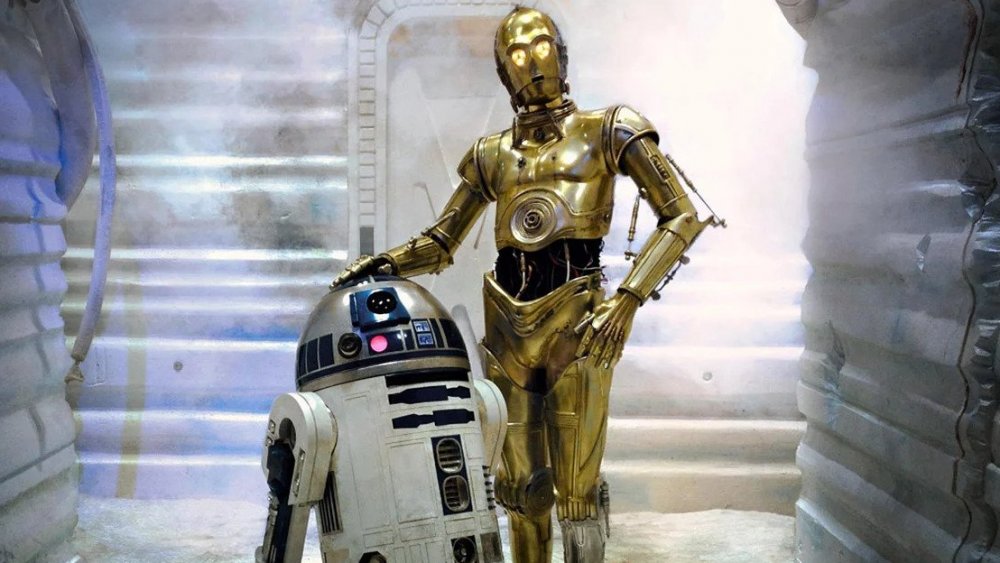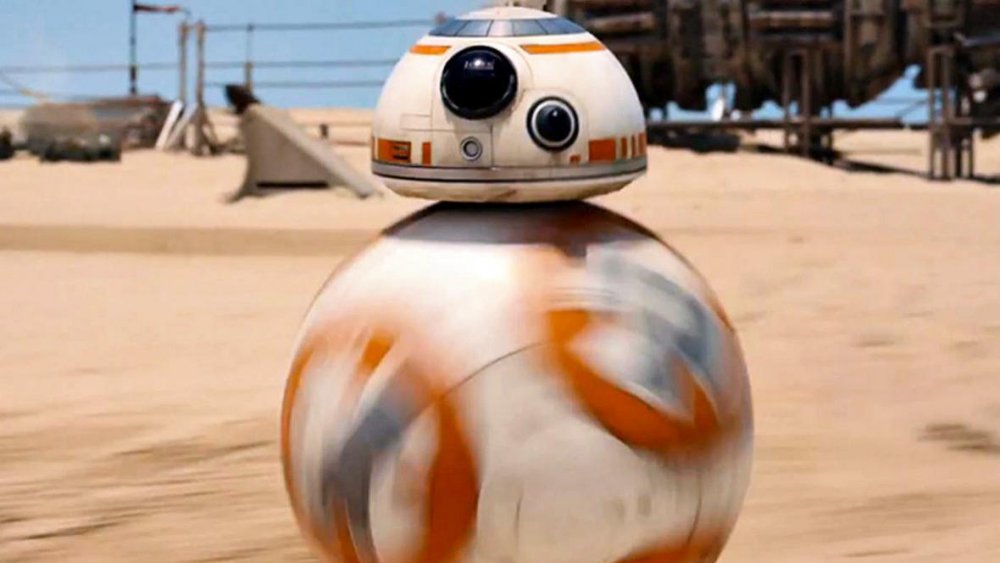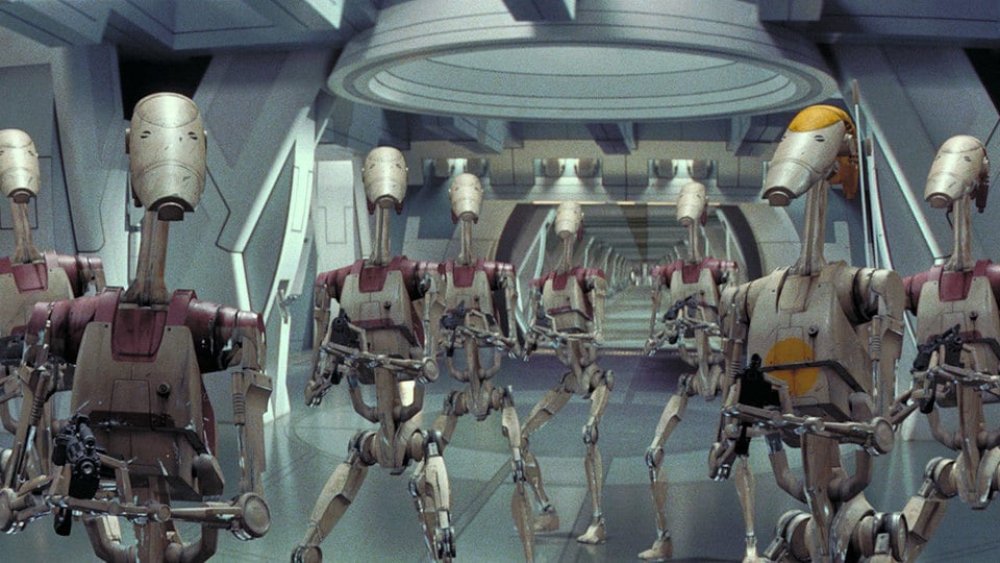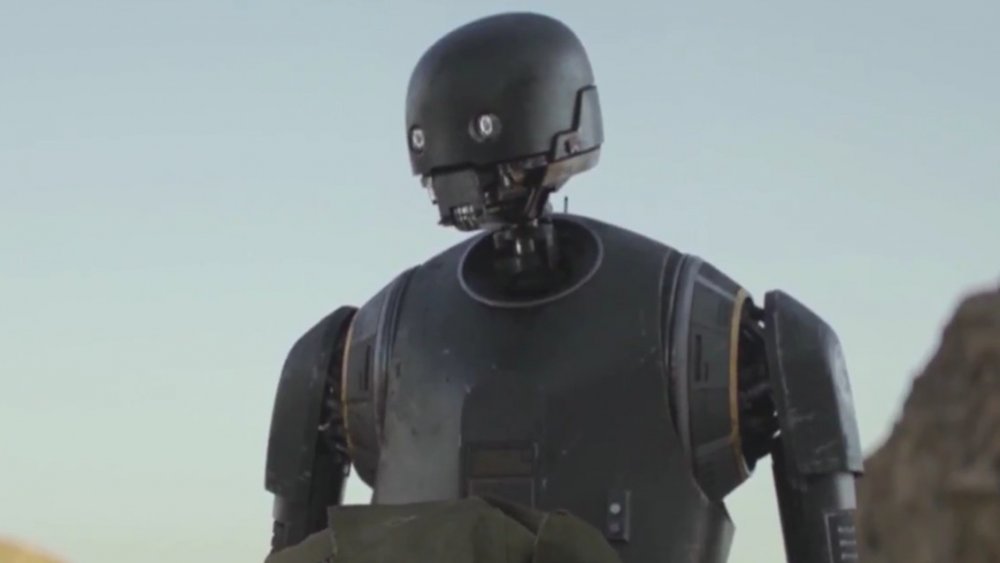Do The Droids In Star Wars Have Feelings?
In the Star Wars universe, R2-D2, C-3PO, and BB-8 are considered to be mere machines — yet somehow, they have won the hearts and minds of fans the world over. We worry about their safety, our hearts racing when Threepio is dismembered (again), or when Artoo lands in the swamps of Dagobah, or when the First Order tracks down BB-8 in the desert of Jakku.
Logically, the concern we feel for the droids only really makes sense if we acknowledge them as sentient beings. Their expressions of emotion make them more relatable to us, and it doesn't take too much in-depth analysis of Star Wars to see that the droids central to the story do indeed express emotion early and often.
C-3PO, the "human-cyborg relations" droid played by Anthony Daniels, is the best example of this. He most frequently expresses distress and panic, offering up statistics and odds for the heroes to ponder as they go into battle (or, you know, don't). He seems elated when Anakin Skywalker (Hayden Christensen) returns to Tatooine in Star Wars Episode II: Attack of the Clones, he's devastated when Padme Amidala (Natalie Portman) dies in Star Wars Episode III: Revenge of the Sith, and he's shocked when Bail Organa (Jimmy Smits) orders his memory wiped at that film's end. Given his almost permanent state of anxiety, it's probably for the best he isn't capable of having an actual heart attack.
But there's a bigger question surrounding the droids in Star Wars. If they truly are sentient beings with feelings, doesn't that make them slaves?
Star Wars and slavery
Slavery is mentioned plenty in Star Wars; the topic was even breached in the original trilogy, most notably in Star Wars Episode VI: Return of the Jedi, when Princess Leia (Carrie Fisher) was rescued after being enslaved by Jabba the Hutt. In the prequel trilogy, our first introduction to Anakin Skywalker (Jake Lloyd) on Tatooine sees him explaining to Queen Amidala that he and his mother had been sold to Gardulla the Hutt before they were lost in a bet to Watto. When Amidala asks if he's a slave, he defiantly responds, "I am a person, and my name is Anakin."
The droids, however, are seemingly ignored when it comes to the conversation about slavery. Artoo and Threepio are much-loved characters, helping out our heroes at every turn, but do they ever do it out of their own free will? Does BB-8 traipse across the desert to protect the map to Luke Skywalker (Mark Hamill) from the First Order because he wants to? Do the Trade Federation's battle droids go into a battle by choice? The short answer is... no.
It's almost obvious in hindsight. From the beginning of Star Wars Episode IV: A New Hope, when Luke is seen installing restraining bolts in his two new droids (whom he bought off the Jawas who had captured them wandering in the desert of Tatooine) to Anakin building a droid to help his mother, despite being an indignant slave himself. In the Star Wars universe, droids are generally thought of as no more than indentured servants.
What do the experts think about the droids in Star Wars?
At San Diego Comic-Con in 2016, the question of whether droids are slaves was raised, and a group of scientists, writers, and experts on the franchise all seemed to agree that as sentient beings owned by other beings, droids definitely fit the definition.
"They are clearly sentient beings. By any objective criterion for what sentience is, they'll pass the test," Travis Langley, a professor of psychology and lifelong Star Wars fan, said. "There's no simulating [emotion], they have an awareness to the degree that we do. They have feelings, they have concerns — [C-3PO] certainly worries about everything."
The droids in the Star Wars universe clearly have no autonomy. Some are subject to more control than others (think the Federation battle droids that couldn't even function without the command ship), but realistically, even those who are valued by the Rebels and the Resistance aren't free to live as they might choose to. Droids, essentially, only exist to serve the needs of their owners, in any and all capacities.
Could droids form their own Resistance?
There are few examples of droids rebelling against the status quo. One comes in the first spin-off film Rogue One: A Star Wars Story, which features K-2SO (Alan Tudyk), an Imperial droid that was reprogrammed by Rebels. K-2 regularly ignores orders, making decisions for himself while offering up plenty of snark to those trying to boss him around.
Another example would be L3-37 (Phoebe Waller-Bridge) from Solo: A Star Wars Story. The second spin-off of the franchise saw a droid make new leaps and bounds to autonomy. Not only was L3 not interested in orders that didn't suit her, and incredibly sarcastic to her master Lando Calrissian (Donald Glover), but she frequently made a public scene trying to get other droids to think for themselves and rebel against their masters.
At the 2016 Comic-Con panel, Kieran Dickson, editor of Outer Places, suggested that perhaps these more rebellious droids were introduced into the franchise because Lucasfilm was beginning to have a bit of remorse over the franchise's treatment of droids. "I think that's something that they're honestly starting to regret," he said. "Droids have always been treated like crap by most people that aren't Skywalkers."
Of course, there has been an in-universe time jump since those two rebellious droids sassed their way into our hearts. Both of the spin-off movies fall between the prequel and original trilogies, and there's been no sign of improvement in the treatment of the mechanical heroes in the main films.
Is the Star Wars universe due for a droid rebellion? Well, one never knows what the future holds. In upcoming visits to the galaxy far, far away, perhaps droids will form their own labor union to demand better working conditions, or maybe the fall of the Dark Side of the Force will usher in a new age of enlightenment, one in which the galaxy's denizens will realize that they should treat their robotic companions more fairly.
Then again, droids do seem to outnumber those slave-driving fleshies... maybe they'll just rise up and take over.



